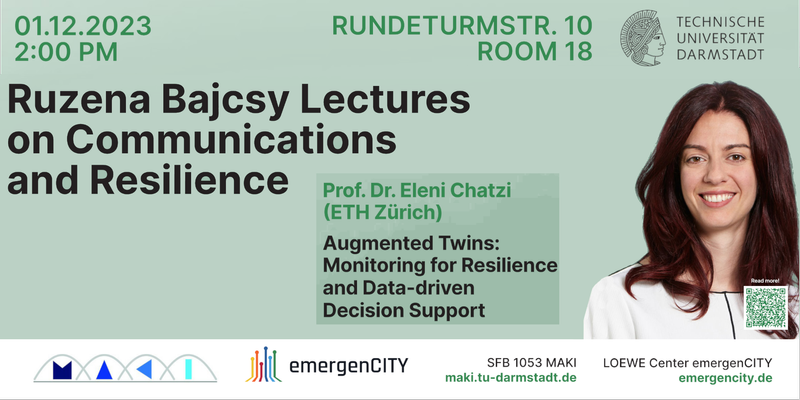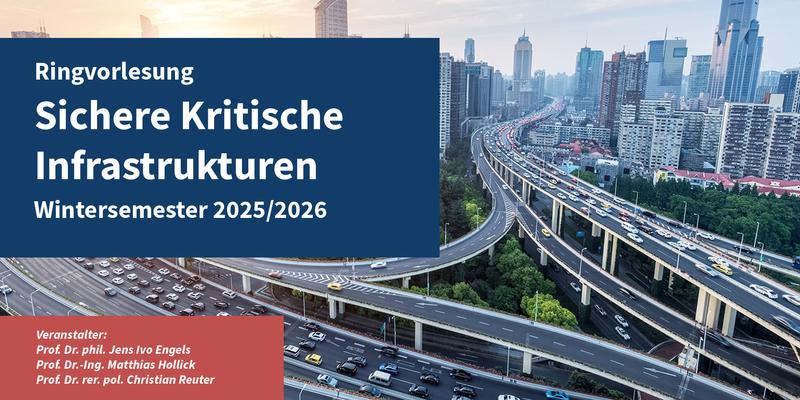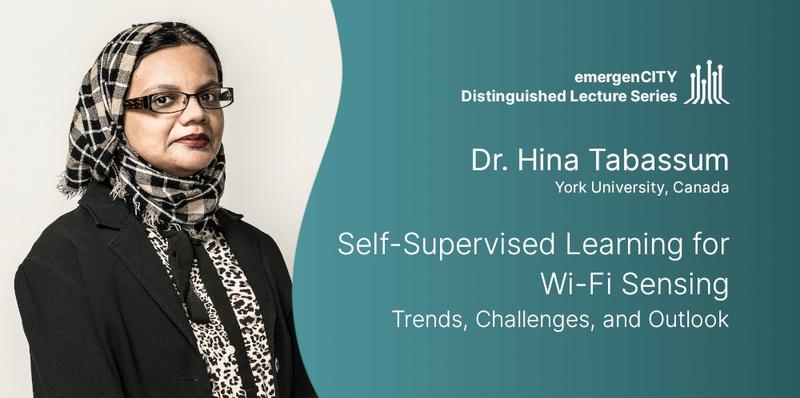Now we are catching up with the Ruzena Bajcsy Lecture with Eleni Chatzi: On Friday, December 1 at 2:00 pm, Prof. Eleni Chatzi from ETH Zurich will speak on “Augmented Twins: Monitoring for Resilience and Data-driven Decision Support”.
The Ruzena Bajcsy Lecture on Communications and Resilience is organized by emergenCITY together with the Collaborative Research Center MAKI.
- Friday, Dec. 01, 14:00
- Lecture with Eleni Chatzi - Augmented Twins: Monitoring for Resilience and Data-driven Decision Support
- Room S3/20/18, Rundeturmstraße 10, 64283 Darmstadt, Germany
Networking Event “Networking of Women in Computing, Engineering and Resilience”
Prior to the lecture, emergenCITY and Maki are organizing the network meet-up Networking of Women in Computing, Engineering, and Resilience. At a breakfast with the speaker Eleni Chatzi (ETH Zurich) on 01.12.2023 from 10 a.m. in the Gastrothèque Lola, exclusively women from the fields of computing, engineering and resilience are invited to get to know each other and exchange experiences.
The breakfast is free of charge and will be held in English and German. However, please register by 22.11.2023 at office@emergencity.de.
- Friday, 01.12.2023; starting at 10 am
- “Networking of Women in Computing, Engineering, and Resilience”
- Lola Gastrothèque, Riegerplatz 7, 64289 Darmstadt, Germany
- Registration via office@emergencity.de
About the Lecture – Augmented Twins: Monitoring for Resilience and Data-driven Decision Support
Modern engineering structures form complex - often interconnected - assemblies that operate under highly varying loads and adverse environments. To ensure a resource-efficient and resilient operation of such systems, it is imperative to understand their performance as-is; a task which can be effectuated through Structural Health Monitoring (SHM). Structural Health Monitoring comprises a hierarchy across levels of increasing complexity aiming to i) detect, ii) localize and iii) quantify damage, and iv) finally offer a prognosis over the system’s residual life. When considering higher levels in this hierarchy, including damage assessment and even performance prognosis, purely data-driven methods are found to be lacking. For higher-level SHM tasks, or for furnishing a digital twin of a monitored structure, it is necessary to i) integrate knowledge stemming from physics-based representations, and ii) assimilate experience garnered from expert operators.
In her talk, Eleni Chatzi discusses the implementation of such a hybrid approach to treating cyber physical systems for tackling the aforementioned challenges and improving our oversight on the operation of critical systems and structures. We offer a view to establishing augmented twin representations, capable of representing the structure as-is, anticipating performance under future stressors, and advising on preventive and remedial actions.
About Eleni Chatzi
Eleni Chatzi joined ETH Zurich in 2010 as the youngest Assistant Professor and is now Associate Professor at the Department of Structural Engineering and Design. After studying Civil Engineering at the National Technical University of Athens (NTUA), she received her PhD from the Dempartement of Civil Engineering and Engineering Mechanics at Columbia University.
In her recent award-winning research, Chatzi combines novel simulation tools with state-of-the-art monitoring methodologies for intelligent and data-driven diagnostics of engineering systems. A key aspect of her research lies in extraction quantifiable metrics that are indicative of structural performance across the component, system, and network levels.
Thematically, Chatzi is concerned with structural health monitoring. She explores a wide range of topics, including applications on emerging sensor technologies and structural control, methods for curbing uncertainties in structural diagnostics and life-cycle assessment, as well as advanced schemes for nonlinear/nonstationary dynamics simulations.



